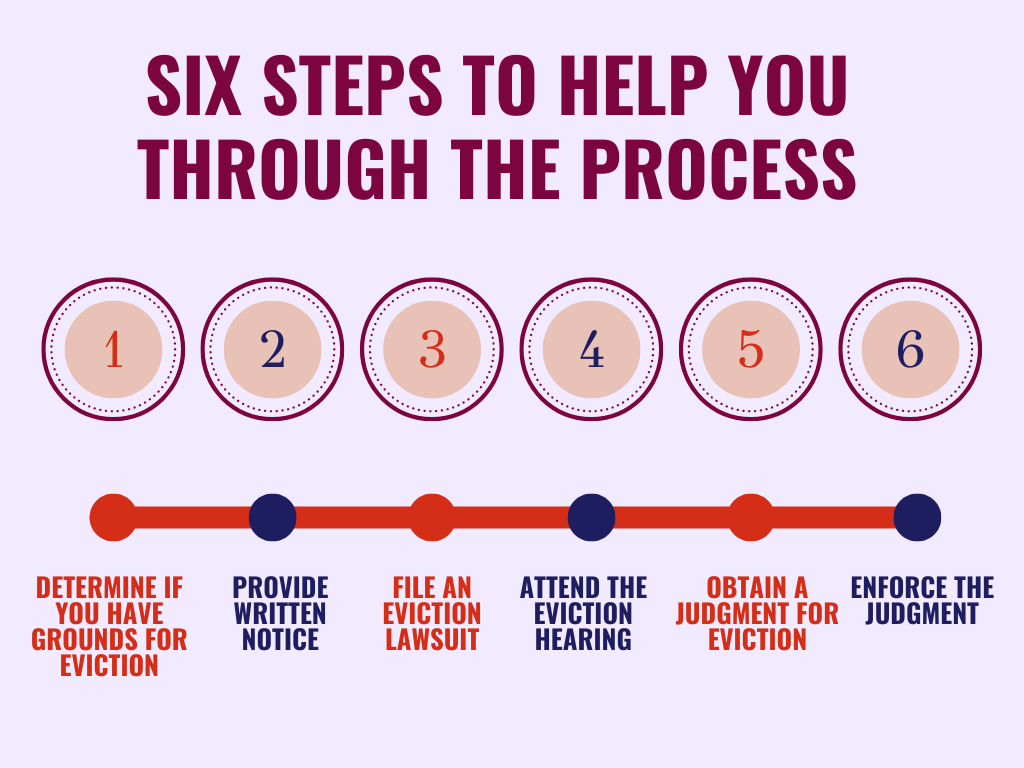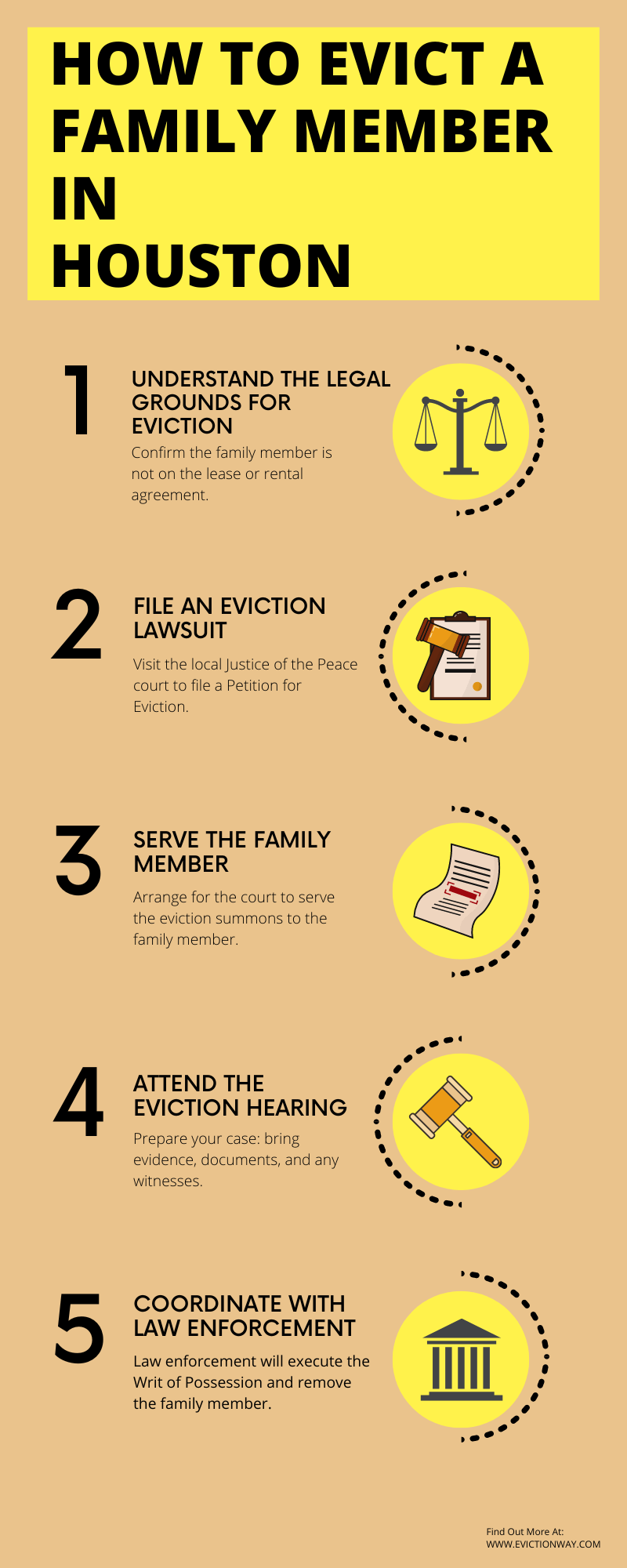Are you facing the difficult situation of needing to evict a family member from your Houston home? This can be a challenging and emotional process, but it’s important to know your rights and options. In this article, we’ll guide you through the steps involved in evicting a family member in Houston. We’ll cover the legal requirements, provide tips on how to do it politely, and share some helpful resources.
First, let’s talk about the legal side of things. In Texas, landlords have the right to evict tenants, including family members, for certain reasons, such as nonpayment of rent, lease violations, or causing damage to the property. The eviction process involves serving the tenant with a notice to vacate, filing a lawsuit in court, and obtaining a judgment from a judge. It’s important to follow the legal procedures carefully to avoid any potential legal issues.
Now, let’s talk about the practical side of things. Evicting a family member can be emotionally draining, so it’s important to approach the situation with sensitivity and respect. Try to communicate your decision clearly and calmly, and give them a reasonable amount of time to move out. If possible, offer to help them find a new place to live or provide financial assistance. Remember, the goal is to resolve the situation amicably while protecting your rights as a landlord.

How To Evict a Family Member In Houston
Evicting a family member can be a difficult and emotional process, but it may be necessary to protect your rights and property. If you are considering evicting a family member in Houston, it is important to understand the legal process and your rights as a landlord.
1. Determine If You Have Grounds for Eviction
In Texas, there are several grounds for eviction, including:
- Nonpayment of rent
- Violation of the lease agreement
- Criminal activity
- Nuisance behavior
2. Provide Written Notice
Once you have determined that you have grounds for eviction, you must provide the family member with written notice. The notice must state the reason for the eviction and the date by which the family member must vacate the property.
3. File an Eviction Lawsuit
If the family member does not vacate the property by the deadline, you will need to file an eviction lawsuit in court. The court will then schedule a hearing to determine whether the eviction is justified.
4. Attend the Eviction Hearing
At the eviction hearing, you will need to present evidence to support your claim for eviction. The family member will also have the opportunity to present their case.
5. Obtain a Judgment for Eviction
If the court finds that you have proven your case, it will issue a judgment for eviction. This judgment will give you the legal authority to remove the family member from the property.
6. Enforce the Judgment
Once you have obtained a judgment for eviction, you can enforce it by having the family member removed from the property by a constable. You may also be able to collect any unpaid rent or damages from the family member.

How Much Does it Cost to Evict a Family Member in Houston?
Evicting a family member is never easy, both emotionally and financially. The cost of eviction can vary depending on several factors, including the complexity of the case, the need for an attorney, and court fees.
In Houston, the average cost of an eviction ranges from $500 to $3,000 or more. This includes the cost of filing fees, serving the eviction notice, and court costs. If an attorney is involved, the cost can be significantly higher.
| Category | Cost | Description |
|---|---|---|
| Court Filing Fees | $150 | This covers filing the eviction lawsuit with the court. |
| Process Serving Fees | $50-$100 | This is the cost of having someone officially deliver the eviction notice to your family member. |
| Attorney Fees | $1,000 – $3,000+ | Hiring an eviction attorney can be very helpful, but their fees can vary significantly depending on their experience and the complexity of the case. Expect to pay several thousand dollars. |
| Other Costs | Varies | There may be other miscellaneous costs, such as postage for certified mail or photocopying documents. |
FAQs: Evicting a Family Member in Houston
Here are some of the most frequently asked questions about evicting a family member in Houston:
What are the grounds for evicting a family member in Houston?
In Houston, you can evict a family member for the same reasons you would evict any other tenant, such as nonpayment of rent, violating the lease agreement, or causing damage to the property.
What if my family member refuses to leave?
If your family member refuses to leave after receiving the notice to vacate, you can file an eviction lawsuit with the court. The court will then hold a hearing to determine whether or not your family member has violated the lease agreement and should be evicted.
Can I evict a family member who is not on the lease?
Yes, you can evict a family member who is not on the lease if they are considered a tenant at will. A tenant at will is someone who lives on the property with the landlord’s permission but does not have a written lease agreement.
What’s the laws on kicking someone out of your house in Texas?
In Texas, you need a court order to legally evict someone from your house. You can’t just kick them out. To get a court order, you must follow specific procedures and have a valid reason for eviction, such as non-payment of rent or lease violation.
Can I kick someone out of my house without notice in Texas?
No, in Texas, you generally cannot kick someone out of your house without giving them at least 3 days’ notice, even if they are a guest.
How long does it take to evict a family member in Texas?
From the time a tenant receives notice to vacate, it takes approximately four weeks, 3 days for a landlord to file suit, then 8-10 days for the tenant to be served with the citation. The court date is set within 10-21 days, and the tenant has five days to appeal the suit following the hearing.
Do you need a reason to evict someone in Texas?
Yes, you need a legal reason to evict someone in Texas. This is usually a breach of the lease agreement, such as non-payment of rent.
How long after the eviction court date do you have to move in Texas?
In Texas, you typically have 5 to 10 days to move out after the eviction court date, depending on the specific circumstances and the court’s order.
Can you physically remove someone from your property in Texas?
No, you cannot physically remove someone from your property in Texas unless they are trespassing or are a threat to your safety. You should call the police if they refuse to leave.
What are valid reasons for eviction in Texas?
In Texas, landlords can legally evict tenants for reasons like non-payment of rent, lease violation, illegal activity, property damage, and failure to vacate after the lease ends.
What are some tips for evicting a family member?
Here are some tips for evicting a family member:
- Document everything: Keep a record of all communications with your family member, including any notices to vacate and court filings.
- Be prepared to go to court: If your family member does not leave after receiving the notice to vacate, you will need to file an eviction lawsuit with the court.
- Get legal help: If you are not comfortable handling the eviction process on your own, you can hire an attorney to represent you.
Related:
How to Evict a Family Member in Lubbock
